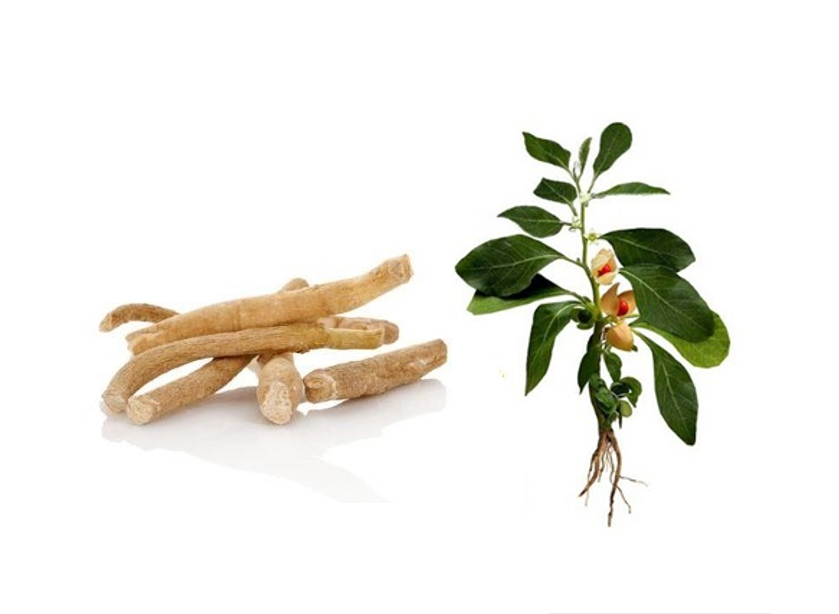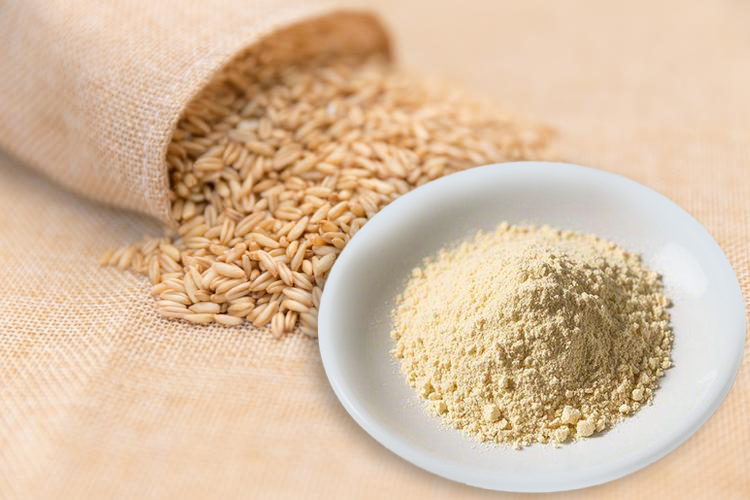Follow Us:
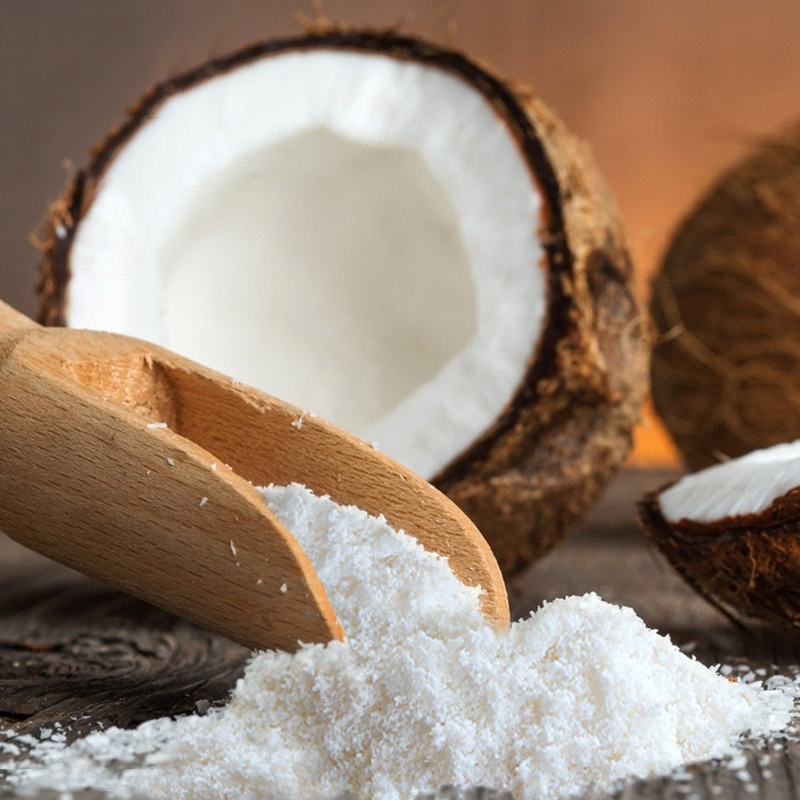
Coconut Powder vs Coconut Flour: Choosing the Right Ingredient
If you’re delving into the world of coconut-based products, you may have come across coconut powder and coconut flour. They may sound similar, but they serve different purposes. Coconut powder, also known as desiccated coconut or coconut milk powder, is made by drying and grinding the flesh of mature coconuts. Coconut flour is made from the leftover pulp after extracting coconut milk from the meat. This process leaves behind a higher fiber content and a lower fat content compared to coconut powder.
As a coconut powder manufacturer, clarifying the difference between the two is crucial to helping consumers make an informed choice. This comprehensive guide will delve into the differences between coconut powder and coconut flour, their uses, nutritional benefits, and tips for incorporating them into your cooking and baking. Let’s explore!
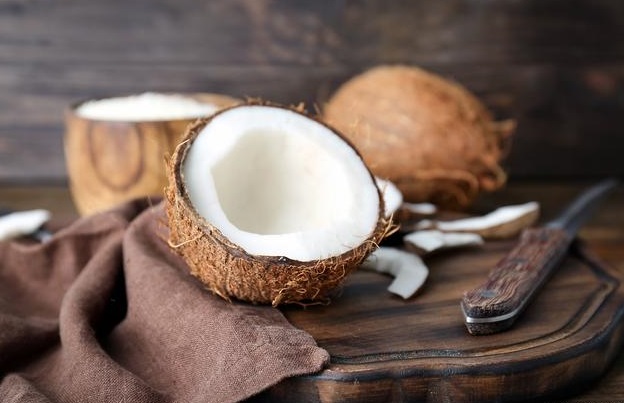
What is Coconut Powder?
Coconut powder is a finely milled product made from dried coconut meat. It retains a rich coconut flavor and aroma, making it an excellent choice for various dishes. Coconut powder is versatile and can be used in smoothies, desserts, and savory dishes. It is often used in Asian cuisine and can be a great addition to curries or soups.
Nutritional Benefits of Coconut Powder
- High in Fiber: Coconut powder is an excellent source of dietary fiber, promoting digestive health.
- Rich in Healthy Fats: It contains medium-chain triglycerides (MCTs), which can provide quick energy and support weight management.
- Vitamins and Minerals: Coconut powder is packed with essential nutrients, including iron, potassium, and magnesium.
What is Coconut Flour?
Coconut flour is made from the leftover pulp after extracting coconut milk from the meat. It is a gluten-free flour alternative that is high in fiber and low in carbohydrates, making it popular among health-conscious consumers and those following specific diets, such as paleo or keto.
Nutritional Benefits of Coconut Flour
- High in Fiber: Like coconut powder, coconut flour is also rich in fiber, aiding digestion and promoting a feeling of fullness.
- Low Glycemic Index: Coconut flour has a lower glycemic index compared to traditional flour, making it a suitable choice for those managing blood sugar levels.
- Protein-Rich: It contains more protein than many other flours, adding nutritional value to your baked goods.
| Nutritional Component | Coconut Powder (per 100g) | Coconut Flour (per 100g) |
| Calories | 300-350 | 400 |
| Total Fat | 15-25 g | 12-20 g |
| Saturated Fat | 13-24 g | 10-18 g |
| Monounsaturated Fat | 0.5-2 g | 0.5 g |
| Polyunsaturated Fat | 0.5-1 g | 1-2 g |
| Cholesterol | 0 mg | 0 mg |
| Carbohydrates | 60-65 g | 60-70 g |
| Dietary Fiber | 30-35 g | 35-40 g |
| Sugars | 5-7 g | 5-7 g |
| Protein | 3-6 g | 8-10 g |
| Iron | 2.4 mg (13% DV) | 2.3 mg (13% DV) |
| Magnesium | 40 mg (10% DV) | 40 mg (10% DV) |
| Potassium | 500 mg (14% DV) | 10 mg (1% DV) |
| Calcium | 30 mg (2% DV) | 30 mg (2% DV) |
| Manganese | 1.5 mg (75% DV) | 1.5 mg (75% DV) |
| Phosphorus | 30 mg (3% DV) | 50 mg (5% DV) |
| Vitamin C | 0.5 mg (1% DV) | 0.4 mg (1% DV) |
Key Differences Between Coconut Powder and Coconut Flour
- Texture and Composition:
- Coconut Powder: Finely milled and retains more fat content, resulting in a creamier texture when mixed.
- Coconut Flour: Drier and more absorbent due to lower fat content, which can affect the moisture levels in recipes.
- Usage in Recipes:
- Coconut Powder: Ideal for smoothies, curries, or as a topping for desserts.
- Coconut Flour: Best used in baking recipes as a flour substitute, typically requiring additional liquid ingredients to maintain texture.
- Flavor Profile:
- Coconut Powder: Provides a stronger coconut flavor, enhancing dishes with its rich taste.
- Coconut Flour: Offers a mild coconut flavor, making it a versatile ingredient in various baked goods without overpowering other flavors.
Health Benefits of Coconut Powder
Coconut powder offers numerous health benefits that make it a valuable addition to your diet, and coconut powder can be incorporated into a variety of pet food formulations and treats.
1. Rich in Fiber
Coconut powder is an excellent source of dietary fiber, which aids digestion, promotes a feeling of fullness, and supports gut health. Incorporating coconut powder into your meals can help regulate blood sugar levels and reduce the risk of chronic diseases.
2. Contains Healthy Fats
The saturated fats found in coconut powder, primarily in the form of medium-chain triglycerides (MCTs), provide a quick source of energy. MCTs are metabolized differently than long-chain fatty acids, potentially supporting weight loss and improving metabolic health.
3. Vitamins and Minerals
Coconut powder is packed with essential vitamins and minerals, including iron, potassium, and magnesium. These nutrients play vital roles in various bodily functions, including muscle health, blood pressure regulation, and energy production.

Health Benefits of Coconut Flour
Coconut flour also offers a range of health benefits, making it a popular choice among health-conscious consumers:
1. Low Glycemic Index
Coconut flour has a lower glycemic index compared to traditional flour, making it suitable for those managing blood sugar levels. Its slow-digesting carbohydrates can help prevent spikes in blood sugar.
2. High in Protein and Fiber
Coconut flour is rich in protein and fiber, contributing to a balanced diet. The high fiber content can help keep you full longer, supporting weight management and reducing cravings.
3. Gluten-Free Option
Coconut flour is naturally gluten-free, making it an excellent alternative for those with gluten sensitivities or celiac disease. It can be easily incorporated into gluten-free recipes, allowing for delicious baked goods without compromising flavor or texture.
How to Use Coconut Powder and Coconut Flour
Cooking with Coconut Powder
Coconut powder is incredibly versatile and can be used in a variety of ways:
- Smoothies: Add a tablespoon of coconut powder to your smoothies for added creaminess and flavor.
- Soups and Sauces: Stir coconut powder into soups or sauces for a rich, creamy texture and a hint of sweetness.
- Desserts: Use coconut powder in recipes for cakes, cookies, or energy balls to enhance the coconut flavor.
Baking with Coconut Flour
Coconut flour can be used in various baked goods, but due to its absorbency, it requires adjustments in recipes:
- Pancakes and Waffles: Substitute up to 20% of the flour in your pancake or waffle recipes with coconut flour for a gluten-free option.
- Cookies: Use coconut flour in cookies, often combining it with other gluten-free flour for the best texture.
- Thickening Agent: Coconut flour can be used as a thickening agent in sauces or gravies, providing a gluten-free alternative.
Tips for Using Coconut Flour
- Adjust Liquid Ingredients: Because coconut flour absorbs more liquid, you may need to increase the amount of liquid in your recipes.
- Combine with Other Flours: For best results, consider combining coconut flour with other gluten-free flours to improve texture and flavor.
- Let the Batter Rest: Allow your batter to sit for a few minutes before cooking or baking to give the coconut flour time to absorb moisture.
Using Coconut Powder in Pet Food
- Mix into Wet Food: Stir coconut powder into your pet’s wet food to enhance flavor and nutrition. This can be particularly appealing to pets that are finicky eaters.
- Add to Homemade Treats: Incorporate coconut powder into recipes for homemade pet treats. Its rich flavor and creamy texture can enhance the overall quality of the treats.
- Smoothies for Pets: Blend coconut powder into a pet-safe smoothie with yogurt or fruit for a nutritious snack.
Using Coconut Flour in Pet Food
- Baking Treats: Use coconut flour as a primary ingredient in homemade pet treat recipes. It can be combined with other gluten-free flours to create a variety of tasty options.
- Thickening Agent: Coconut flour can act as a thickener in homemade gravies or sauces, enhancing the nutritional profile of pet meals.
- In Dry Food: Include coconut flour in the formulation of dry pet foods to boost fiber content and provide a gluten-free option.
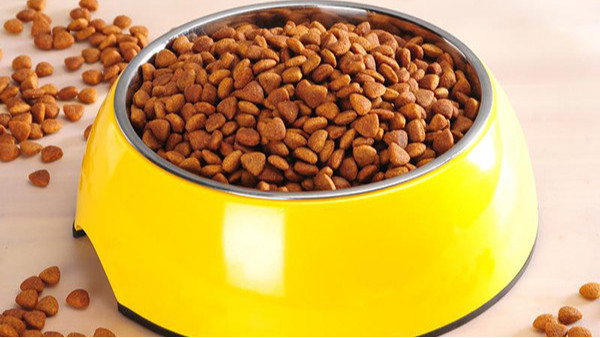
Where to Buy Coconut Powder?
You can buy coconut powder from the coconut powder factory, GREEN AGRI is a plant extract manufacturer with 20 years of experience. We specialize in producing high-quality coconut powder.
The raw materials of our products come from reliable planting bases. our company implements a traceability system to track the source of the raw materials. We prioritize quality at every stage of production, ensuring our products are free of pesticide residues and heavy metals. The entire production process is carried out to the highest specifications and hygiene standards.
Products Guarantee:
- Have ISO, FDA, HALAL, KOSHER, FSSC22000 certifications;
- Manufacturing Process Optimization;
- U.S Warehouse Service;
- Flexible QC Solution;
- 30% Cost Saving;
- 13 patents.
Service:
- We serve agents, distributors, traders, B2B customers;
- Support for Amazon business, Small business friendly;
- Accept small orders, support sending samples;
- 1-by-1 Product Inspection;
- Support COA Request;
- Competitive Prices.
Coconut powder and coconut flour are two unique coconut products that offer distinct flavors and benefits. While coconut powder brings a rich, creamy texture and a bold coconut flavor, coconut flour serves as a versatile gluten-free alternative for baking. By understanding the differences between these two coconut products, you can make informed decisions.
FAQ
1. Can I Substitute Coconut Powder for Coconut Flour?
While they can sometimes be used interchangeably, it’s essential to note that coconut powder has a different texture and fat content. If you substitute coconut powder for coconut flour, be prepared to adjust the liquid content in your recipe.
2. Is Coconut Powder Healthy?
Yes, coconut powder is a healthy addition to your diet, packed with fiber, healthy fats, and essential nutrients. However, like all ingredients, it should be consumed in moderation.
3. How Should I Store Coconut Powder and Coconut Flour?
Both coconut powder and coconut flour should be stored in a cool, dry place, preferably in an airtight container to maintain freshness. They can also be stored in the refrigerator or freezer for extended shelf life.
4. Can I Use Coconut Powder in Baking?
Yes, coconut powder can be used in baking, but it’s best to use it in combination with other flours. It adds flavor and moisture but is not a direct substitute for flour.
5. Can I Use Coconut Flour in Homemade Pet Food?
Absolutely! Coconut flour can be a great addition to homemade pet food recipes, providing fiber and nutritional benefits. Just be sure to balance it with other ingredients to meet your pet’s dietary needs.













